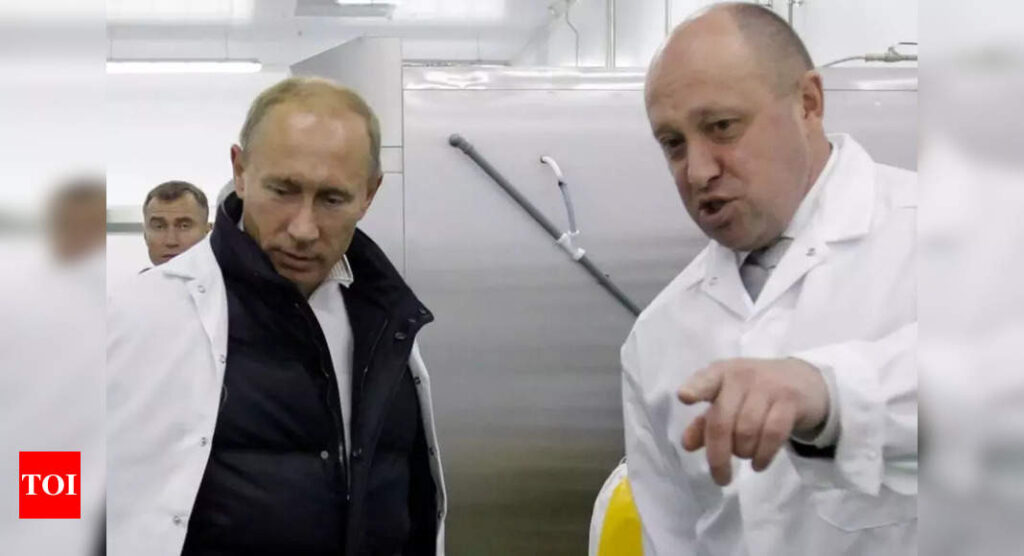Short-lived mutiny in Russia sheds light on Putin’s hold on power – Times of India

For a few chaotic, head-snapping hours this weekend, the notion did not seem so far-fetched. But even with the apparent end to the immediate threat posed by Yevgeny Prigozhin’s rebellious mercenary army, the short-lived uprising suggested that Putin’s hold on power is more tenuous than at any time since he took office more than two decades ago.
The aftermath of the mutiny leaves US President Joe Biden and U.S. policymakers with both opportunity and danger in perhaps the most volatile moment since the early days of the invasion of Ukraine. Disarray in Russia could lead to a breakdown of its war effort just as Ukrainian forces are mounting their long-awaited counteroffensive, but officials in Washington remained nervous about an unpredictable, nuclear-armed Putin feeling vulnerable.“For the U.S., it’s advantageous in that the Russians are distracted and this will weaken their military effort in Ukraine and make them less likely to continue to instigate new problems in places like Syria,” said Evelyn Farkas, executive director of the McCain Institute for International Leadership and a former Pentagon official. “The main thing we care about is making sure that professional military remains in control of all of the nuclear facilities.”
The armed standoff on the road to Moscow, brief as it was, represented the most dramatic struggle for power in Russia since the 1991 failed hard-liner coup against Mikhail Gorbachev and the 1993 showdown between Boris Yeltsin and parliament. Unlike those episodes, however, Washington did not have a favorite in the struggle. Prigozhin is no more a friend of the United States than Putin.
Biden responded to the crisis by not responding, opting for caution rather than speaking out, which would risk giving Putin ammunition to claim this was all a foreign plot, which is often the first line in the Kremlin playbook whenever domestic trouble arises. Biden delayed his departure for Camp David to convene a secure video briefing with top advisers in the Ward Room of the White House — a makeshift Situation Room while the real one is being renovated — and also spoke with the leaders of Britain, France and Germany.
Jake Sullivan, Biden’s national security adviser, canceled a trip to Denmark meant to drum up support for Ukraine so he could accompany Biden to Camp David and conducted the planned meeting by video instead. Gen. Mark Milley, chair of the Joint Chiefs of Staff, likewise scrubbed a visit to Israel and Jordan. But other than reiterating American support for Ukraine, the administration remained silent, letting events play out while officials studied the intelligence for insight into what was happening.

04:39
VIDEO: How Wagner Group’s revolt against Russia took a U turn within 24 Hours
The administration has drafted contingency plans for such a scenario for a long time but was left scrambling Saturday just like everyone else to get hard information out of Russia and to interpret what it meant, relying as much on social media and other online sources as traditional intelligence assets.
U.S. officials were paying special attention to Russia’s nuclear arsenal, nervous about instability in a country with the power to wipe out most of the planet. But a senior administration official said the government detected no change in the disposition of Russia’s weapons and did not change America’s nuclear posture either.
“It’s pretty fast-moving, so it’s hard to know where we will end up, but the two big issues for the U.S. are the command and control over the nuclear weapons and the implications for the Ukrainian efforts to liberate more territory,” said James Goldgeier, a professor of international relations at American University and a specialist on Russia.
Andrea Kendall-Taylor, a longtime Russia-intelligence analyst who is now at the Center for a New American Security, said the United States has limited capacity to influence events there and should focus on preventing spillover violence and disorder.

02:34
Who is Yevgeny Prigozhin, Wagner Group head Russia has accused of planning a coup?
“Washington should avoid fueling the deeply held paranoia inside Russia that the U.S. or NATO will seek to exploit the chaos,” she said. “That will be important for preventing an overreaction in Moscow and over the long term if there comes a time to stabilize relations with some future Russia.”
Any way they looked at it, U.S. officials saw the events on the ground as proof of Putin’s eroding position.
For months, they have been monitoring Prigozhin’s escalating feud with the leadership of the Defense Ministry over the management of the Ukraine war, wondering, as others have, why Putin tolerated such open dissent and speculating about whether the Russian president was secretly encouraging it for his own political purposes.
But by Saturday, there was little doubt in the White House and national security agencies that Prigozhin had done major damage to Putin. Once a key lieutenant of Putin’s who orchestrated the interference into the United States election in 2016, Prigozhin publicly debunked Putin’s entire rationale for the war, refuting the notion that the invasion was a justified reaction to supposed threats to Russia by Ukraine and NATO.
Moreover, in his speech to the nation as the crisis unfolded Saturday, Putin likened the situation to 1917, when the last czarist government collapsed in the middle of a war that was going badly, a comparison that only fueled the image of a leader in the Kremlin losing his grip on the country. And by making a deal with Prigozhin only hours after threatening to crush him, Putin reinforced the reality that he no longer has exclusive control over the use of force on Russian territory.
“One thing is very clear: Putin looks very weak,” said Alina Polyakova, president of the Center for European Policy Analysis in Washington. But a collapse of Putin’s government, she added, would pose its own hazards. The United States and its allies “should focus on supporting Ukraine while planning all possible scenarios, including a fall of the Putin regime and its replacement by a hard-right faction that will be more brutal and less restrained when it comes to the war in Ukraine.”
Even assuming he holds on to power, policymakers worry that Putin could grow more erratic if he feels backed into a corner. “Weakness begets riskier behavior on Putin’s part,” said Jon Huntsman Jr., a former ambassador to Russia under President Donald Trump. “There’s a new ripple in Putin’s ‘invincibility,’ which will be exploited from every angle.”
For Ukraine, which has been working in tandem with U.S. arms suppliers and intelligence officials to push invaders out of its territory, the Russian internal strife provided a welcome balm after its long-awaited counteroffensive got off to a slow start.
The Wagner Group mercenary organization, led by Prigozhin, had been seen as the most effective Russian force on the battlefield, but with its charismatic leader heading to seeming exile in Belarus and its troops being absorbed by the Russian Defense Ministry, it may no longer be the ferocious fighting unit that it has been.
Unfortunately for Ukraine, the Prigozhin rebellion ended before major Russian forces were pulled off the front lines to protect Moscow, according to U.S. information. But U.S. officials anticipate that the discord will fuel doubts already plaguing Russian troops about the point of the war and the competence of their leadership. And few believe that Prigozhin is a spent force who will simply go back to selling hot dogs, as he did as a young man. U.S. officials expect that he still has cards to play.
Indeed, Kurt Volker, a former ambassador to NATO and special envoy for Ukraine, said the Prigozhin revolt spells the beginning of the end of the war and Putin’s tenure, even with the deal that short-circuited the march on Moscow.
“Don’t trust the reversal,” he said. “This is positioning. Prigozhin wants to be seen as a hero for Russians while he lines up more support and makes demands. The state will go after him, and that can be his excuse for ‘reluctantly’ defending himself.”
As Volker put it, there will be “many more shoes to drop.”








